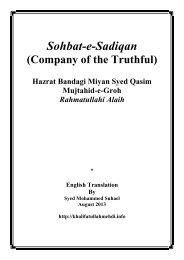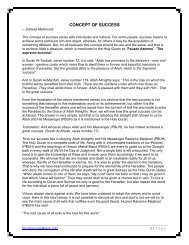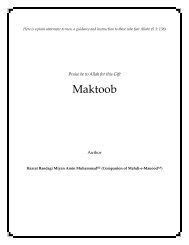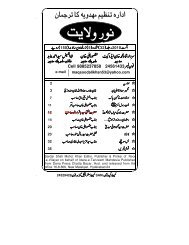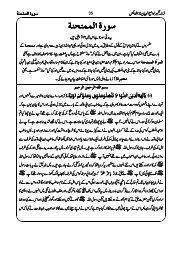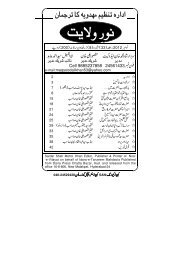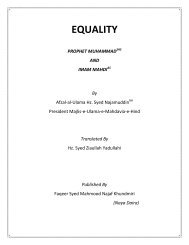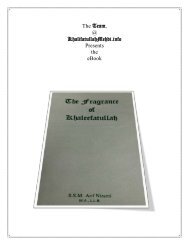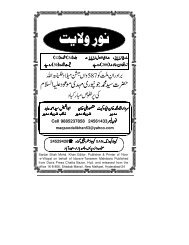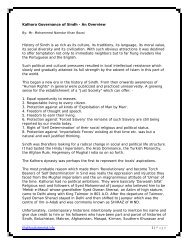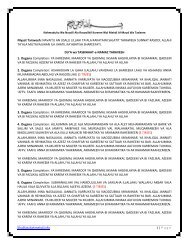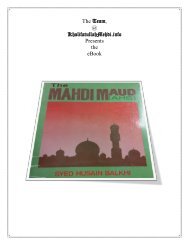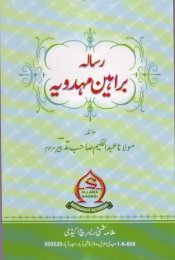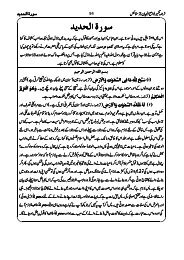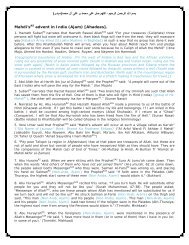Siraj-ul-Absar (English) - Khalifatullah Mehdi (AHS)
Siraj-ul-Absar (English) - Khalifatullah Mehdi (AHS)
Siraj-ul-Absar (English) - Khalifatullah Mehdi (AHS)
You also want an ePaper? Increase the reach of your titles
YUMPU automatically turns print PDFs into web optimized ePapers that Google loves.
28<br />
hadis does not give the benefit of its being correct by itself. Then, how can it be of<br />
benefit to the belief in other matters?<br />
Then, know that the text of the hadis does not enter the domain of credence, except in<br />
rare cases. On the other hand, the attribute of weakness or strength or a state<br />
between the two extremes is envisaged with reference to the attributes of the<br />
narrators, that is, their sense of justice and equity, zab’t [control and discipline],<br />
memory, etc. Or [it is judged] in respect of its credentials, like ittisal [being adjacent],<br />
inqita’ [separation or amputation], irsal [dispatch] and iztirab [impatience].<br />
And the sahih hadis is the one, whose chain of authority is unbroken and is narrated<br />
by a person who is disciplined as a Just Man and he narrates it from a person who<br />
has similar qualities and it has remained free of irreg<strong>ul</strong>arities and defects. It is of<br />
seven kinds: (1) the best and the highest is that hadis which has the consensus of<br />
Muslim and Bukhari; (2) Then comes the hadis, which has been narrated only by<br />
Bukhari; (3) Then comes the hadis that has been reported only by Muslim; (4) Then<br />
comes the hadis that satisfies all the conditions of both Bukhari and Muslim, even if<br />
both have not described it with authorities; (5) Then comes the hadis that satisfies the<br />
conditions of Bukhari; (6) Then comes the hadis that satisfies the conditions of Muslim;<br />
and finally (7) comes the hadis, which has been treated as correct by imams of hadis,<br />
other than Bukhari and Muslim. Hence, the hadis that has been narrated with<br />
grammatical patterns, like ‘said so-and-so’ or the verb or the command or [prefixed<br />
by] ‘narrated by’ in the ma’roof [active] tense also is treated as sound. And the hadis<br />
that has been narrated in a majhool [passive] tense is not considered to be sound. It<br />
has been described in books of principles like the Husami and others that:<br />
If the reporter of the hadis is well known in Fiqh and ijtihad [in the exercise of<br />
judgment] – like the Kh<strong>ul</strong>afa-e-Rashidin [the first four orthodox Caliphs of<br />
Islam] or the Ibadilah-e-Salasa [the three Abd<strong>ul</strong>lahs] 16 and Zaid ibn Sabit,<br />
Mu’az ibn Jabal, Abu Musa Ash’ari and Ayesha RZ and others who are wellknown<br />
in Fiqh and judgement –, the hadis reported by these personalities is<br />
treated as hujjat [incontrovertible proof] and qiyas [analogy] is abandoned.<br />
Hence, the Sheikh [Muttaqi] who is inclined towards devious ways and who has<br />
deviated from justice and equity sho<strong>ul</strong>d establish the soundness of the hadis and then<br />
make allegations against us.<br />
Whereas the fact is that this hadis is not from the Sihah 17 and a hadis similar to it has<br />
been narrated by Kalbi that: The kingship of the whole world will be given to none<br />
but three virtuous men – S<strong>ul</strong>eiman, Z<strong>ul</strong>-Qarnain and Abu Karb; and three infidels –<br />
Namrood [Nimrod], Bakht Nasr and Zahaak. This hadis is taken from the book,<br />
Sharah-e-Shifa. Hence, this hadis requires that the masters of the world sho<strong>ul</strong>d be six,<br />
16 The three Abd<strong>ul</strong>lahs are: Abd<strong>ul</strong>lah ibn Masud, Abd<strong>ul</strong>lah ibn ‘Abbas and Abd<strong>ul</strong>lah ibn Umar RZ .<br />
17 Sihah-e-Sittah are the six famous Sunni collections of the sayings of the Holy Prophet SLM , made by<br />
Bukhari, Muslim, Tirmizhi, Abu Dawood, Nasai, and Ibn Majah.



